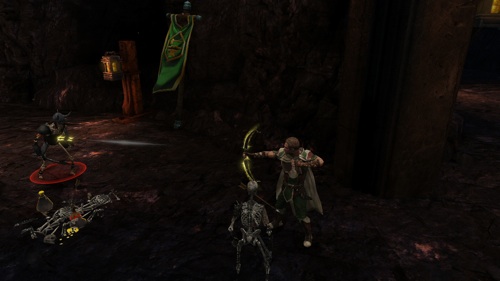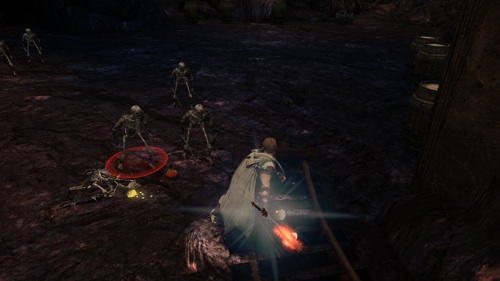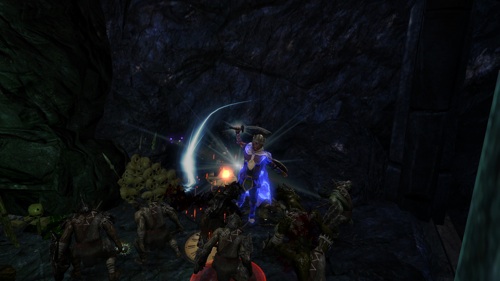The biggest problem with Dungeons & Dragons is that you
need to get a big group of people together in order to play it. It’s a great experience, ruined by the
need to interact with other humans. That’s why so many video games are inspired
by D&D; you can pretend to be a wizard, without having to organize a group of
people in the same place at the same time, or suffer the company of people
whose only redeeming quality is a love for the game.
Most Western action RPGs are influenced by Dungeons &
Dragons to some degree, but every couple of years a new, officially-licensed
D&D game appears. Some of
these have been epic role-playing adventures, like Baldur’s Gate, or Neverwinter Nights, and some have been less impressive. Dungeons & Dragons
Daggerdale falls right in the middle. It will give fans an authentic taste of
the current 4th Edition rules, set in the fan-favorite Forgotten
Realms, while offering competent yet unremarkable gameplay for people who want
some basic action role-playing.
It reminds me most of the old Playstation 2 game Baldur’s
Gate Dark Alliance, and that’s not
necessarily a bad thing. Dark
Alliance was a critically-acclaimed co-op action RPG that distilled the current
D&D rules to the basics and offered a nice chunk of multiplayer fun for the
console crowd who weren’t into the tactical solo play of Bioware’s Baldur’s
Gate series. Daggerdale offers the
same sort of basic RPG experience, with an emphasis on action, and multiplayer.
Adventurers are able to choose from four different classes,
each with a mandatory race. You
have Human fighter, Dwarf Cleric, Elf Rogue and Halfling Mage. You can
customize your character to some extent, by choosing from different spells, Feats, and special attacks. If
you want your rogue to be better at hand-to-hand combat, you can do that, or
you can specialize in ranged attacks.
Although your stats are pre-rolled, you can choose how they rise as you
level up. You’ll also be able to
outfit your hero with many options for weapons and armor.
Like every installment in this genre, it’s based around a
loot system, and the item drops are one of the better aspects of the game. I readily found useful items, and
didn’t end up hauling around an inventory full of things I couldn’t use. I could also sell stuff at will, right
from my inventory screen without having to do a loot haul back to town.
Merchants usually had something I wanted as well, so in this respect the game
stands out among it peers.
Unfortunately that’s pretty much the only way that it stand
out. As a single-player game, it’s
flat-out boring. Combat is button
mashy with players hammering either the melee, or ranged attack, and firing spells as fast as they recharge.
There’s little challenge and tactics don’t need to be used, aside from
the rare case when you’re overwhelmed by large numbers of bad guys. Even then,
it’s just a question of using your defensive move until your best powers
recharge. Speaking of defense,
each class has a special defensive ability; the Rogue can doge, the Fighter can block,
Mages can Blink, or teleport to a safespot a few feet away. It does ad some variety when combat gets
too hot.
The story, is a reasonably good one that gives you
justification for running around to fight things, or take on fetch quests. A doer-of-evil is up to all sorts of
trouble and the four heroes have been summoned to help, and must battle their
way up through his tower.
Unfortunately, the story is told mostly through text, and NPC’s do not
speak. They just sort of grunt at
the beginning of their line.
The interaction with NPC’s doesn’t involve any sort of
choice beyond Accept or Decline quests.
Players are basically on a linear ride, and the only real story choices
are whether or not you decline sidequests. There are occasional cutscenes that use
limited animation with voice overs but bulk of the story is from NPC text, and the missions still boil down to
the player being sent to kill six enemies, or gather the three lost
whatevers.
But, of course this game is really meant for multiplayer, and
isn’t intended to be a solo story-based game. There it overcomes many of its
flaws. The boring button-hammering
becomes much more interesting when you’re using your unique skills to help
balance a party, and when you have to come to the aid of your pals. There are no bots or AI companions in single-player mode, so multi-player changes it significantly.
The developer has given players the options of both local
and online multi-player. Your
character and campaign can be used in solo, local co-op, or online, and
progressing in any mode will let you level up and advance through the
story. The game is rather short,
but players will probably want to run through it over and over again
with all four archetypes. Local
co-op is a blessing for genre fans looking to get friends into a game.
While Daggerdale is mediocre in many respects, it will
certainly appeal to D&D fans and it is a readily accessible game for people
new to action rpgs. The accessibility is probably the game’s greatest strength,
and that’s a good quality for a low-priced downloadable game. It’s probably too
simplified for hardcore dungeon-crawler fans, but it’s certainly an enjoyable
title for hack-n-slash fans looking for some co-op.